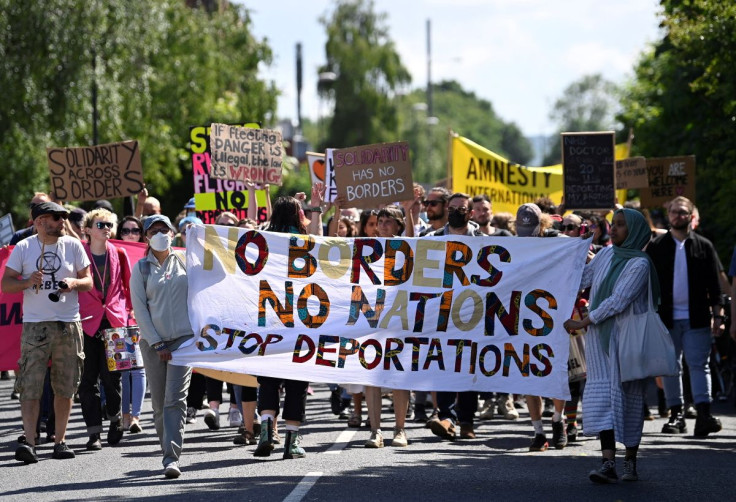UK Court Hears Appeals To Stop Rwanda Deportation Flight

London courts began hearing two last-minute legal challenges to block the British government's deportation of asylum seekers to Rwanda as the number of people on the first removal flight on Tuesday fell to 11.
Britain has agreed a deal with Rwanda to send some asylum seekers to Rwanda in return for an initial payment of 120 million pounds ($148 million) and additional payments based on the number of people deported.
The government says the deportation strategy will undermine people-smuggling networks and stemm the flow of migrants risking their lives by crossing the English Channel in small boats from Europe.
Human rights group say the policy is inhumane and will put migrants at risk. The UNHCR has said Rwanda, whose own human rights record is under scrutiny, does not have the capacity to process the claims.
Initially, some 37 individuals were scheduled to be removed on the first flight to Rwanda, but the number has dwindled in the face of legal challenges to just 11.
The government has not provided details of those selected for deportation, but charities say they include people fleeing Afghanistan and Syria.
Prime Minister Boris Johnson is determined to press ahead with the policy despite the legal challenges and opposition, reportedly including from Prince Charles, the heir to the British throne.
"It's very important that the criminal gangs who are putting people's lives at risk in the Channel, understand that their business model is going to be broken and is being broken by this government," Johnson told LBC radio.
"They are selling people false hope and luring them into something that is extremely risky and criminal."
The government said the deportation plan would deter the Channel crossings, although more than 3,500 people have reached Britain in small boats since the middle of April when the Rwanda scheme was unveiled, according to government figures
As the court hearings were taking place about 35 migrants arrived in Dover, some carrying their possessions in black bags, where they were taken away by British border forces.
UN CONCERNS
The Court of Appeal began hearing arguments from two human rights groups and a trade union on Monday after a judge refused their request for an injunction blocking the flight taking off.
The judge said on Friday there was a "material public interest" in allowing the government to pursue the policy".
Raza Hussain, the lawyer for some of the claimants, said the judge had not given enough weight to the concerns of the UNHCR, which had warned that some asylum seekers could be sent back to a country where they would be at risk of persecution.
Government lawyer Rory Dunlop said Tuesday's flight was important.
"This is a policy which if it works could save lives as well as disrupting the model of traffickers," he said.
If the claimaints won, it would realistically mean no flights could take place before a full trial on the scheme's legality which will not take place for six weeks, he said.
The High Court separately began hearing arguments from Asylum Aid, a refugee charity, which launched a second legal challenge to stop the government flying refugees to Rwanda.
Charlotte Kilroy, a lawyer representing Asylum Aid, said asylum seekers were not given enough time to challenge their deportation, meaning there was a a high risk of unlawful and unsafe decisions.
This case is being heard by the same judge who on Friday rejected granting an injunction.
($1 = 0.8121 pounds)
© Copyright Thomson Reuters {{Year}}. All rights reserved.





















